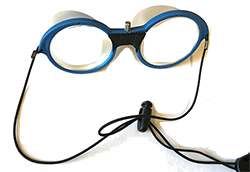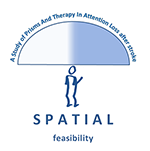Project outcomes
Some stroke patients have difficulty taking part in therapy because of attention loss (spatial inattention).
SPATIAL is now complete.
We have analysed the findings and would like to share the results with you. We have produced an easy-access summary report which you can download and an audio/video version of the report.
Further reading
If you would like to know more about the project’s outcomes, here are other helpful resources.
Ann, the project’s patient, carer and public involvement lead, presented this poster at the UK Stroke Forum in December 2020.
Read a copy of our recent publication, “A study of prisms and therapy in attention loss after stroke (SPATIAL): A feasibility randomised controlled trial”.
Project background
Our research is testing the feasibility of delivering and investigating an occupational therapy intervention that may improve rehabilitation for stroke survivors with spatial inattention.
Spatial inattention is when the stroke causes poor awareness of one side of their body or the space around them, causing difficulties completing everyday tasks.
Patients with spatial inattention shortly after having a stroke often make a poor recovery. They miss out on the full benefits of early stroke therapy and are often discharged from hospital needing a lot of help at home.
SPATIAL investigated whether it is practical to use an intervention (prism adaptation training) to help patients with spatial inattention to participate in NHS occupational therapy, and how best to design a trial to test effectiveness.
We examined whether prism adaptation training increased engagement in occupational therapy and tested ways of measuring the possible impact on everyday functioning.
SPATIAL was a joint project between staff at The University of Manchester and the University of the West of England. Researchers at the University of the West of England explored the experiences of participating patients, carers and occupational therapists.

The intervention
One possible therapy for inattention is prism adaption training (PAT).
This involves patients wearing glasses with large lenses (prisms) which alter the user’s view to one side.
While wearing the prism glasses, the patient points at a target repeatedly for five minutes in the hope of temporarily adapting the brain.
Once the glasses are removed, the patient switches from pointing too far one side to the other, becoming more aware of their ‘neglected’ side in the process.
This adaptation may help patients to participate in occupational therapy if therapy is delivered immediately after prism training.

Project aims
This feasibility project had a number of different aims relating to delivering PAT and measuring patients’ responses.
The main aims were to find out whether:
- staff can deliver prism adaptation training during occupational therapy;
- prism adaptation training enhances patients’ ability to take part in occupational therapy;
- prism adaptation training and the study processes are acceptable to patients and carers;
- it would be possible to do a future, large, randomised, controlled trial.
Further information
Where did the study happen?
Six NHS trusts around the North West of England took part. We estimated we would recruit around 60 stroke patients with spatial inattention, 40 informal carers and approximately 12 occupational therapy staff.
Salford Royal Foundation Trust is was the lead NHS site for this two year study which began on 30 June 2018. Recruitment ended in January 2020.
How did we involve stroke survivors?
We had a dedicated SPATIAL patient advisory group of stroke survivors led by Ann Bamford. They worked in collaboration with us on many aspects including:
- developing the study design
- co-writing grant and ethics applications and patient-facing documents
- raising awareness of the study
- monitoring study progress
- helping interpret the findings and planning the next steps
There were also two independent stroke survivor members on our trial steering committee providing overall supervision of the trial.
If you would like to be involved as an advisor in our future stroke research please email: spatialstroke@manchester.ac.uk.
Who funded this research and who granted ethical approval?
This research was funded by the National Institute for Health Research’s (NIHR) Research for Patient Benefit Programme (Grant Reference: PB-PG-0816-20016).
The views expressed are those of the authors and not necessarily those of the NHS, the NIHR or the Department of Health and Social Care.
This research has also received ethical approval from the Yorkshire & the Humber NHS Research Ethics Committee (Ref. 18/YH/0480).

Contact us
Audrey is the chief investigator for SPATIAL.
![]() For any enquiries, please email: spatialstroke@manchester.ac.uk
For any enquiries, please email: spatialstroke@manchester.ac.uk
![]() Visit the stroke research website.
Visit the stroke research website.
![]() Visit the SPATIAL Twitter account.
Visit the SPATIAL Twitter account.




 Audrey Bowen
Audrey Bowen